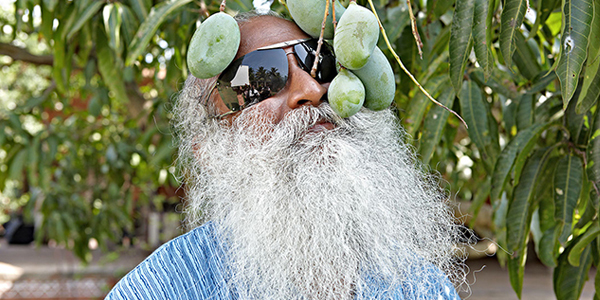Stop Thinking Yourself Out of Life

“Even if you have Einstein’s brain working within you, it is still petty because thought cannot be bigger than life.” —Sadhguru
Sadhguru tells us the story of when Aristotle met Heraclitus, to illustrate how we tend to get lost in our thought process and lose perspective in life.
Sadhguru: Someone told you, “I think therefore I am.” Is that really true? It is only because you exist that you can generate a thought, isn’t it? Your thought process has become so compulsive, and your focus has shifted from your existence to your thought to such an extent, that now you are beginning to believe that you exist because you think. Even without your silly thoughts, existence is. What can you think, really? Just the nonsense that you have gathered and recycled. Can you think something other than what has been fed into your head? All you are doing is recycling old data. This recycling has become so important that people even dare to say “I think, therefore I am.” And that has become the world’s way of life.
Because you are, you can think. If you choose, you can fully be and still not think. The most beautiful moments in your life – moments of bliss, moments of joy, moments of ecstasy, moments of utter peace – were moments when you were not thinking about anything. You were just living.
Do you want to be a living being or a thinking being? Right now, ninety percent of the time you are only thinking about life, not living life. Have you come here to experience life or to think about life? Everybody can think up their own nonsense whichever way they want; it need not have anything to do with reality. Your psychological process is a very small happening compared to the life process, but right now it has become far more important. We need to shift the significance to the life process once again.
Aristotle is known as the father of modern logic; his logic was immaculate. He was intellectually brilliant, no question about that, but he tried to stretch logic to all aspects of life, and in many ways he was crippled.
There is a story, I do not know if it is a fact, but it smells true. One day, Aristotle was walking on the beach. A glorious sunset was happening, but he had no time for such petty daily events. He was thinking seriously about some great problem of existence, because for Aristotle, existence is a problem, and he believes he is going to solve it. Thinking seriously, he was walking up and down the beach. There was another man on the beach who was doing something very intensely – so intensely that even Aristotle could not ignore him.
You know, people who think too much about their own nonsense end up ignoring life around them. They are the people who don’t smile at anybody or even look at anybody in the world. They have no eyes to look at a flower, a sunset, a child or a smiling face – or if it is an unsmiling face, they have no inclination to make it smile; they have no such small duties or small cares in the world! They ignore all the life around them because they are all busy, solving the problems of existence.
But Aristotle could not ignore this man, and he closely observed what he was doing: this man was going to the ocean, coming back, going to the ocean, coming back, all with great intensity. So Aristotle stopped and asked, “Hey, what are you up to?”
The man said, “Don’t disturb me, I am doing something very important,” and went on and on.
Aristotle became even more curious and asked, “What are you doing?”
The man said, “Don’t disturb me, something very important.”
Aristotle said, “What is this important thing?”
The man showed a little hole he had dug in the sand, and he said, “I am emptying the ocean into this hole.” He had a tablespoon in his hand.
Aristotle looked at this and laughed. Now, Aristotle is the kind who can spend a year without a single moment of laughter, because he is intellect. It takes a heart to laugh. Intellect cannot laugh; it can only dissect.
But even Aristotle laughed at this and said, “This is ridiculous! You must be insane. Do you know how vast this ocean is? How can you ever empty this ocean into this little hole? And that too, with a tablespoon? At least if you have a bucket, there’s some chance. Please give this up; this is madness, I am telling you.”
The man looked at Aristotle, threw the spoon down and said, “My job is already done.”
Aristotle said, “What do you mean? Forget about the ocean being empty; even the hole is not full. How can you say your job is done?”
The other man was Heraclitus. Heraclitus stood up and said, “I am trying to empty the ocean into this hole with a tablespoon. You are telling me it’s ridiculous, it’s madness, so I should give it up. What are you trying to do? Do you know how vast this existence is? It can contain a billion oceans like this and more, and you are trying to empty it into the small hole of your head – and with what? With tablespoons called thoughts. Please give it up. It’s utterly ridiculous.”
If you want to know the experiential dimensions of life, you will never know it with petty thought. It does not matter how well you can think, human thought is still petty. Even if you have Einstein’s brain working within you, it is still petty because thought cannot be bigger than life. Thought can only be logical, functioning between two polarities. If you want to know life in its immensity, you need something more than your thoughts, something more than your logic, something more than your intellect.
This is the choice you have: either you learn to live with creation, or you create your own nonsensical creation in your head. Which option do you want to exercise? Right now, most people are living in thoughts, something in a psychological space, not in an existential space. And so they are insecure, because it can collapse any moment.
The planet is spinning on time. Not a small event. All galaxies are going perfectly well, the whole cosmos is doing great. But you have one nasty little thought crawling through your head, and it is a bad day.
You have the freedom to think whatever you want. Why don’t you just think pleasant thoughts? The problem is just this: you have a computer for which you have not bothered to find the keypad. If you had the keypad, you might type the right words, isn’t it? You don’t have the keypad, and you are punching your computer like a cave man, so all the wrong words keep coming up. Try this with your computer; the result will look like an obscenity.
You have lost your perspective of life because you think you are much more than you are. In cosmic space, if you look at yourself in perspective, you are less than a speck of dust, but you think your thought – which is less than a speck in you – should determine the nature of existence. What I think and what you think is not of any importance. What is important is the grandeur of existence — the only reality.
You have heard of the word “Buddha.” One who has risen above his intellect, or one who has risen above the discriminatory and logical dimension of his life, is a Buddha. Human beings have invented millions of ways to suffer. For all this the manufacturing unit is just in your mind. When you have risen above your mind, this is the end of suffering. When there is no fear of suffering, there is absolute freedom. Only when this happens, a man is free to experience life beyond his limitations. So being a Buddha means that you have become a witness to your own intellect. The essence of yoga and meditation is just this: once you have a clear space between you and your mind, you experience a completely different dimension of existence.
The next step
You could try this simple practice. Set your tap – or any similar contraption – in such a way that only five to ten drops fall per minute. See if you can observe each drop – how it forms, how it falls, how it splashes on the ground. Do this for fifteen to twenty minutes a day. You will suddenly become conscious of so many things around and within you that you are completely unaware of right now.


